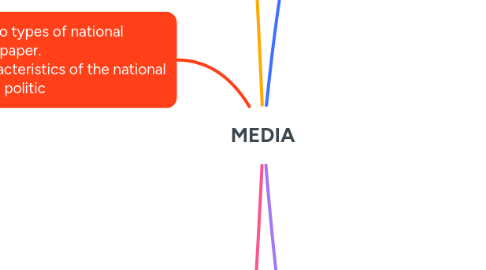
1. I. Importance of the national press.
1.1. • National newspapers are the main source of information
1.2. • Have a great influence on daily life
2. II. Two types of national newspaper. Characteristics of the national press politic
2.1. 1. Quality Papers
2.1.1. Educated readers
2.1.2. Serious topics: politics, economy, culture
2.1.3. Formal language, complex sentences
2.1.4. Few photos, more analysis
2.1.5. Broadsheet format (before 2004)
2.2. 2. Popular Papers
2.2.1. Mass audience
2.2.2. Focus: entertainment, sports, scandals
2.2.3. Simple language, short sentences
2.2.4. Bold headlines, colorful photos
2.2.5. Tabloid format
2.3. 3. Format Changes
2.3.1. Before 2004:
2.3.2. Quality = Broadsheet
2.3.3. Popular = Tabloid
2.3.4. 2004: The Times & The Independent → Tabloid
2.3.5. 2005: The Guardian → Berliner size
2.4. 1. Quality Papers
2.4.1. Educated readers
2.4.2. Serious topics: politics, economy, culture
2.4.3. Formal language, complex sentences
2.4.4. Few photos, more analysis
2.4.5. Broadsheet format (before 2004)
2.5. 2. Popular Papers
2.5.1. Mass audience
3. III. Characteristics of the national press politics
3.1. Political influence of the press
3.1.1. Political Views of Newspapers
3.1.1.1. Newspapers have political leanings
3.1.1.2. Not part of political parties
3.2. The Role and Power of Newspapers
3.2.1. Power of the Press
3.2.1.1. Called “The Fourth Estate”
3.2.1.2. Not controlled by the government
3.2.1.3. Owned by big corporations
3.2.1.4. Focus: profit, ads, copies
4. IV. Characteristics of the national press: sex and scandal
4.1. Why Do Sex and Scandal Sell?
4.1.1. Psychological curiosity:
4.1.2. Schadenfreude:
4.1.3. Simplicity:
4.2. Famous Scandals in the Press
4.2.1. The Profumo Affair (1963)
4.2.2. Princess Diana
4.2.3. Hugh Grant and Divine Brown
4.3. How Tabloids Create Drama
4.3.1. ‘Gotcha’ headlines:
4.3.2. Invasive photography:
4.3.3. Sensational language:
4.3.4. Sources? What sources?
4.4. Press Freedom and Lack of Control
4.4.1. very high level of freedom
4.4.2. The IPSO can investigate complaints but not real punishment
4.5. British Public – Complicated Feelings
4.5.1. many people complain about tabloid journalism but millions still read or visit their websites every day.
4.5.2. If you become famous, you give up your privacy
4.5.3. Others feel sorry for celebrities and support stronger privacy protections
5. V. BBC, ITV and TV.
5.1. BBC Trusted but Not Tabloid
5.1.1. Founded in 1922 in London
5.1.2. Located at Broadcasting House — a famous Art Deco building in central London
5.1.3. - Accurate news - Cultural and historical documentaries - Children’s show - Science and nature
5.2. ITV – A Commercial Rival to the BBC
5.2.1. Launched in 1955, ITV was the first commercial TV network in the UK funded by advertisements, not by license fees.
5.2.2. Focused on entertainment and ratings, mass appeal and big audiences
5.3. British Television – What the Public Loves to Watch
5.3.1. 📺 Top genres people love:
5.3.1.1. Soaps
5.3.1.2. Reality TV
5.3.1.3. Comedy
5.3.1.4. Documentaries
